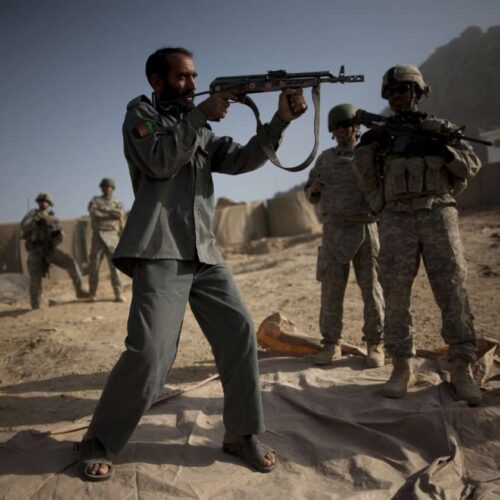Introduction
As the U.S. military heads for the door in Afghanistan, one of its most important tasks is to train Afghan police to take control of the nation’s security. But a billion-dollar Afghan police training contract, now being administered by the Army, has encountered some troubles, according to a new report by the Defense Department’s Inspector General’s office.
In just the first four months after the contract was signed in December 2010, its cost shot up $145 million, or 14 percent. A series of late revisions has slowed the training process for Afghan police, the IG report said, and the contract has been written in a way that allows new costs to accumulate without penalty.
The IG blamed the Army for the early cost hike, asserting that those overseeing the work by the lead contractor, DynCorp International, should have anticipated that its scope would be greater than initially estimated.
The new contract replaces three previous training contracts, costing a total of $4.954 billion. Two of these were also held by DynCorp. It started adding personnel and associated expenses at the Army’s request less than a month after the contract was awarded.
In January 2011, for example, Army officials told DynCorp to provide a communications system that would ensure contact with patrols and to create a database tracking ANP personnel records. The Army also amended the contract to add 31 trainers, 15 instructors and medics and four senior mentors to lead teams of advisers. According to the IG report, these positions were essential to training the Afghan police and should have been included in the initial proposal.
According to DynCorp spokeswoman Ashley Burke, the company had to increase its support staff from 29 to 73 to oversee the added field personnel, eventually tripling the costs of its program management office from $8 million to $24 million.
In a response included with the IG report, Army contracting officials defended the $145 million cost jump as a consequence of “the vagaries of wartime environment.” Army Contracting Command spokeswoman Ann Jensis-Dale said officials at Central Command, or CENTCOM, made the changes based on new information in Afghanistan.
CENTCOM spokesman Oscar Seara, said the late contract revisions were partly a result of Afghan police having “been largely neglected” in the last 10 or 11 years, as the U.S. military worked exclusively with the Afghan National Army. Seara said, during that time, development of Afghan law enforcement fell outside the scope of DoD’s mission in Afghanistan.
Ben Freeman, an investigator for the non-profit Project on Government Oversight, who specializes in Defense personnel, called the Army’s reasoning faulty.
Adding costs within a month of the contract’s signing suggests that Army contracting officials should have foreseen those costs and included it in the original contract, Freeman said. He also faulted the Army for offering a fixed-price-plus-cost contract, an agreement that allows defense contractors to increase costs of the contract as the mission progresses.
“It creates a perverse incentive for the defense contractor,” Freeman said. “They know they’re going to get their money, and whatever comes on top of that won’t come out of their pocket.”
At the same time it faulted the Army’s handling of the police training contract, the Pentagon’s Inspector General cited 19 other contracts Army officials failed to properly award or manage out of 45 active contracts reviewed.
Army contracting officials failed to properly oversee the bidding process for six of those contracts, the IG said in two separate reports (one from May 25, and the other from May 30). In thirteen cases, the Army allowed subcontracts to go to companies before adequately vetting them. The 19 contracts were valued at approximately $45.4 million.

Join the conversation
Show Comments